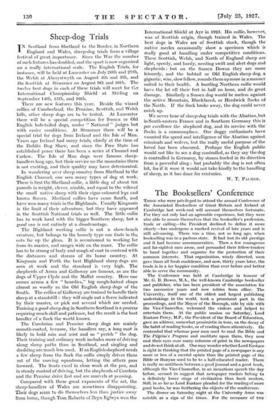Sheep-dog Trials
IN Scotland from Shetland to the Border, in Northern England and Wales, sheep-dog trials form a village festival of great importance. Since the 'War the number of such fixtures has doubled, and the sport is now organized on a really international scale. The English Trials, for instance, will be held at Lancaster on July 26th and 27th, the Welsh at Aberystwyth on August 4th and 5th, and the Scottish at Stranraer on August 9th and 10th. The twelve best dogs in each of these trials will meet for the International Championship Shield at Stirling on September 14th, 15th, and 16th.
There are new features this year. Beside the wizard collies of Cumberland, the Pennine, Scottish, and Welsh hills, other sheep dogs are to he tested. At Lancaster there will be a special competition for Sussex or Old English bob-tailed dogs, under " National " judges but with easier conditions. At Stranraer there will be a special trial for dogs from Ireland and the Isle. of Man. Years ago Ireland had many trials, chiefly at the time of the Dublin Dog Show, and since the Free State has established peace there has been a series at Clonmel and Carlow. The Isle of Man dogs were famous sheep- handlers long ago, but their service on the mountains there is not exciting, and their quality may have deteriorated. In wandering over sheep country from Shetland to the English Channel, one sees many types of dog at work.
There is first the Shetland collie, a little dog of about ten pounds in weight, clever, nimble, and equal to the wiles of the small native sheep with their cigar-coloured legs and brown fleeces. Shetland collies have come South, and have won many trials in the Highlands. Usually Kingussie is the limit of their adventure, but they have appeared in the Scottish National trials as well. The little collie has to work hard with the bigger Southern sheep, but good one is not entirely at a disadvantage.
The Highland working collie is not a show-bench, creature, but belongs to the homely type one finds in the cots far up the glens. It is accustomed to working far from its master, and ranges wide on the moor. The collie has to be strong of body and rough of coat to contend with the distances and storms of its home country. At Kingussie and Perth the best Highland sheep dogs are seen at work and the standard is very high. The shepherds of Arran and Galloway are famous, as are the dogs of Upper Clyde and the Moffat country. Here one comes across a few " beardies," big rough-haired chaps almost as woolly as the Old English sheep dogs of the South. The collies of Galloway are trained to handle their sheep at a standstill : they will single out a fleece indicated by their master, or pick out several which are needed. Training a good sheep dog in Southern Scotland is a process requiring much skill and patience, but the result is the best handler of a flock the world knows.
The Cumbrian and Pennine sheep dogs are mainly smooth-coated, because, the handlers say, a long coat is likely to hold rain and mist and so " perish" the dog.
Their training and ordinary work includes more of driving along sheep paths than in Scotland, and singling and shedding are much less used. If anEnglish shepherd needs a few sheep from the flock the collie simply drives them ant of the moving squadrons, letting the others pass forward. The Scots excel in close work at the pen, and in steady control of driving, but the shepherds of Cumbria and the Pennine drive fast and are marvels at penning.
Compared with these great exponents of the art, the sheep:handlers of Wales are sometimes disappointing. Their dogs seem to do themselves less than justice away from home, though Tom Roberts of Bryn Eglwys won the International Shield at Ayr in 1925. His collie, however, was of Scottish origin, though trained in Wales. The best dogs in Wales are of Scottish stock, though the native merles occasionally show a specimen which is really good at handling under competitive conditions. These Scottish, Welsh,. and North of England sheep are light, speedy, and hardy, needing swift and alert dogs and shepherds : but on the Sussex Downs they are more leisurely, and the bobtail or Old English sheep dog, a gigantic, wise, slow fellow, rounds them up more in a manner suited to their health. A bustling Northern collie would have the lot off their feet in half an hour, and do great damage. Similarly a Sussex dog would be useless against the active Mountain, Blackfaced, or Herdwick flocks of the North. If the flock broke away, the dog could never catch up.
We never hear of sheep-dog trials with the Alsatian, but in South-eastern France and in Southern Germany this is par excellence the shepherd dog, and its service with the flocks is a commonplace. Our doggy enthusiasts have vaunted the speed and intelligence of the Alsatian against criminals and wolves, but the really useful purpose of the breed has been obscured. Perhaps the English public would not like to see a dog controlled, as they say the dog is controlled in Germany; by stones hurled in its direction from a powerful sling : but probably the dog is not often hit, for if it were it would not take kindly to the handling of sheep, as it has done for centuries.
W. T. PALMER.






















































 Previous page
Previous page